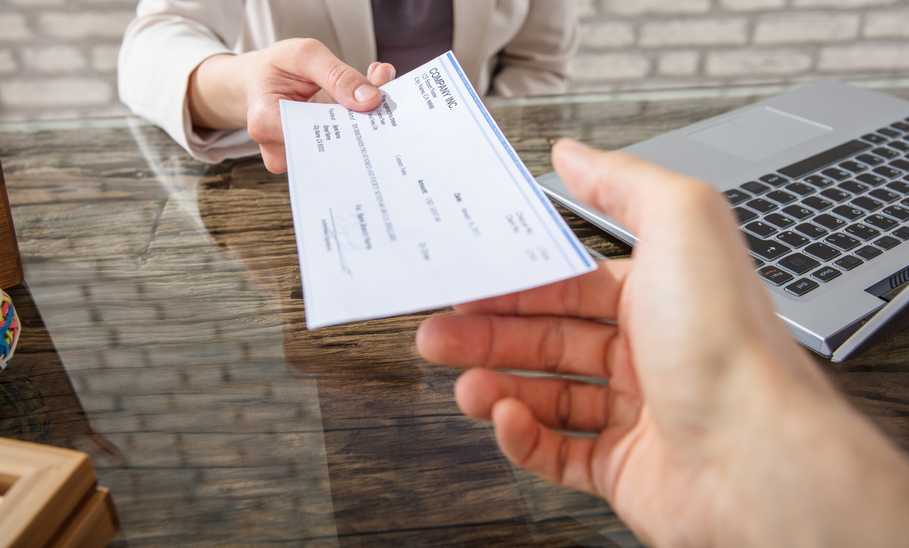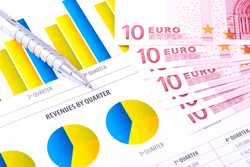Cashier's Check? Cost, Uses, Alternatives


Our evaluations and opinions are not influenced by our advertising relationships, but we may earn a commission from our partners’ links. This content is created by TIME Stamped, under TIME’s direction and produced in accordance with TIME’s editorial guidelines and overseen by TIME’s editorial staff. Learn more about it.
While paper checks are much less common today, there are still times when paying via check is a preferred (or at least, allowed) payment method. However, paper checks can be risky for merchants to accept since they often take days or even weeks to process. If the bank account on which the check was drawn doesn’t have the necessary funds when payment is actually processed, the recipient of that check could be out of luck.
A cashier’s check can be a more secure method of paper payment. That’s because cashier’s checks are issued against and guaranteed by the bank’s own funds, rather than being guaranteed by the funds held in a personal account. Since the bank verifies those funds and stands behind the check, using one is much less risky and more widely accepted by merchants.
Here’s an indepth look at cashier’s checks, how to get one, and why you might need to use a cashier’s check in the first place.
Cashier’s checks can be a preferred payment method for large transactions, such as the purchase of land, a vehicle or boat, or even a home. Because cashier’s checks are secured by the issuing bank, and the check draws from the bank’s account instead of your personal account, there is little risk that the funds won’t be there when it’s time for the merchant or seller to cash the check.
You may want to use a cashier’s check to pay for an important or large purchase when the seller charges a fee to process a card payment. In some cases, a wire transfer or automated clearing house (ACH) transfer might take too long and delay the transaction, or you could even incur fees for these bank transfers. In that case, a cashier’s check could be the fastest and most affordable option.
Banks set their own fees for cashier’s checks, so the cost can vary from one financial institution to the next. In general, you can expect to pay between $10 and $20 for a cashier’s check. Some banks won’t charge a fee if you have certain accounts or a relationship status, so be sure to check with your own financial institution to see if it will issue a cashier’s check for you for free.
Cashier’s checks are issued by financial institutions, such as banks and credit unions. Typically, you can’t get a cashier’s check from a bank unless you have an account, though there are a few exceptions.
In order to get a cashier’s check, you’ll need to request and pay for one (if applicable). The bank will then draw those funds from your account and hold them in the bank’s own transactional account until the check is cashed by the recipient.
Cashier’s checks are a specialized payment option. They are generally only offered by banks and credit unions to their own customers. Similar products, such as money orders, are available elsewhere, such as check cashing companies, supermarkets, and even gas stations. However, these may not be accepted as readily as cashier’s checks or may have smaller amount limits.
Many cashier’s checks are issued in person. Your check will be signed by a cashier, teller, or other bank representative and you’ll walk out with a check in hand.
However, depending on your bank, you may also be able to order a cashier’s check online. Capital One customers, for example, can order a cashier’s check through the bank’s mobile app or web platform, which can be delivered via FedEx as quickly as the next business day.
Cashier’s checks are usually good for between 60 and 180 days, though this can vary from one banking institution to the next. A cashier’s check will generally have an expiration date, or at least a number of days that the check will be valid, printed on the check.
If an expiration date or valid day range isn’t noted, the check may simply not expire. In that case, you can assume that the check is valid as long as the bank remains operational, though some merchants may request a new check after a certain period of time. It’s always wise to only request a cashier’s check right before you need to use it, so there are no issues with stale checks or even losing the check before it’s handed off.
Not sure if a cashier’s check is right for you, or don’t have the option to get a cashier’s check from your bank? Here are some alternatives to consider.
A certified check is similar to a cashier’s check in that the financial institution verifies that you have adequate funds in your account, and that you are you, before issuing the check. The important difference between the two is that a certified check is still written from (and will draw from) your own personal account, whereas a cashier’s check will draw from the bank’s own account.
Another difference is that while some banks allow cashier’s checks to be ordered online, certified checks must be requested in person. That’s because part of the “certified” aspect of the check is that the bank verifies your identity.
Your funds aren’t removed from your account when issuing a certified check, only “earmarked.” This can make a certified check less secure than a cashier’s check, at least in the eyes of the recipient. A certified check can still bounce, as you may have already spent or transferred those funds between when the check was issued and when the recipient cashes it. A cashier’s check, however, is unlikely to bounce as long as the bank is still operational.
A money order is also very similar to a cashier’s check, in that both require you to hand over the funds upfront and both are issued by another financial institution. This can make them more secure to merchants and sellers, since they are not likely to bounce.
While cashier’s checks are only available from banks and credit unions, you can get money orders from your local supermarket or big box store (like Walmart) as well as many check cashing businesses, gas stations, the United States Postal Service (USPS), and others. This makes money orders more accessible to those who don’t have a bank account or aren’t near one of their bank’s branches.
Both cashier’s checks and money orders are available for a fee. Money orders can be cheaper than cashier’s checks, but the caveat is that money orders typically have an amount limit. A money order from USPS, for example, is limited to $1,000 for a $3 fee. If you need to send a small amount of money, this may be a more economical solution than a $10 or $20 cashier’s check. If you need to send $10,000, though, buying 10 money orders would mean spending $30 and keeping 10 different paper checks safe, which is more hassle and cost than a single cashier’s check.
A cashier’s check will sometimes include some of your personal information, such as your name, financial institution, or account number, on the check. A money order does not, so it may be safer for privacy reasons, especially if you want to send one through the mail.
A cashier’s check is a safe and secure way to submit a paper payment, especially for a large purchase. These checks are considered safe for consumers to use, as they may not have all of your personal bank information listed (if any), helping to protect you against fraud. They’re also considered safer for merchants and sellers, as the funds are guaranteed by the financial institution and are unlikely to bounce.
Losing a cashier’s check can be a much bigger hassle than losing a personal check. Since the bank is guaranteeing those funds, stopping a cashier’s check and replacing it is a much more involved process.
If you lose a cashier’s check, the very first step is to notify your bank. While this won’t prevent someone from depositing or cashing the check, it can flag the check in the bank’s system if that occurs.
Your bank may then require you to purchase an indemnity bond before a new check can be issued. Indemnity bonds are a form of insurance coverage, which protects the bank if the original check is found and processed—that way, the bank isn’t stuck paying out on both checks in a worse case scenario.
With an indemnity bond, you—not your bank—are considered responsible for the first check. Even after purchasing an indemnity bond, your financial institution may still require you to wait for a period of time (such as 30 to 90 days) before issuing another cashier’s check in its place. If you needed those funds to make a time-sensitive payment or purchase, this could be detrimental. For this reason, only buy a cashier’s check when you are ready to give it to a seller or merchant, and take close care to avoid losing it.
You generally can’t cancel or put a stop on a cashier’s check. If the check is lost, notify your bank immediately and request information about next steps for getting it replaced.
If you simply don’t need the check anymore—for example, a planned transaction fell through—you can typically deposit the funds back into your account. Your bank may require you to write a statement, often on the check itself, noting that the check wasn’t used for its intended purpose. Then, the bank can usually just deposit the check into your account and you’ll be back where you started (minus the original cashier’s check fee).
If you are purchasing a cashier’s check directly from your bank, you can rest assured that the paper check you’re given is genuine and valid. However, if you’re receiving a cashier’s check from somewhere else, you’ll want to take certain steps to avoid accepting a fraudulent payment.
Most cashier’s checks have fraud prevention features built in, such as color-changing paper, holograms, or special patterns on the paper. Be sure to check which features your check has to confirm it’s genuine.
You’ll also want to go over the details on the check. Cross-check the institution’s address and phone number by searching for it online. You can also call the bank directly to confirm the check’s authenticity. Just be sure to call the number you have searched for online, rather than simply calling the number printed on the check (in case it’s fraudulent).
Cashier’s checks are an alternative paper payment method, often used for large purchases and transactions. These checks are written against a financial institution’s own account, rather than your personal account, making them more secure for the merchants and sellers to whom you may give them. Cashier’s checks do come at a modest cost, but can be obtained in person in just minutes or online as quickly as a single business day.
When you request a cashier’s check from your bank or credit union, the funds will be withdrawn from your account and placed in the institution’s own account. You’ll then be given a check against that account—as if the bank were writing a check for your purchase instead of you. Your recipient, whether a merchant or seller, can then deposit that check into their own account the same way they would any other check.
Cashier’s checks can be a more secure way to pay for large purchases or provide added peace of mind for important transactions like the transfer of a car, boat, or house. These checks are written by financial institutions against the bank’s own transactional account, so they are less likely to bounce or otherwise get returned, compared to personal checks.
A regular check, or personal check, is guaranteed by an individual’s own checking account. If there aren’t adequate funds in that account when the check is cashed, the transaction will be returned and the depositor may be caught short with little to no recourse. A cashier’s check is guaranteed by the bank’s account, so there is little risk that it will bounce or get returned as long as the bank is operational and the check is genuine.
A cashier’s check will typically cost between $10 and $20 to issue, though this can vary by financial institution.
The information presented here is created by TIME Stamped and overseen by TIME editorial staff. To learn more, see our About Us page.



